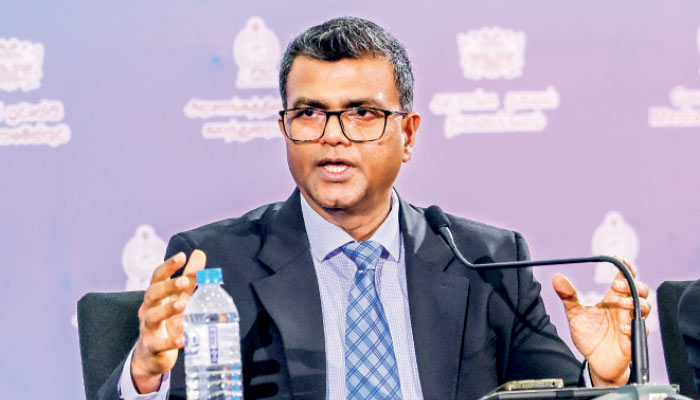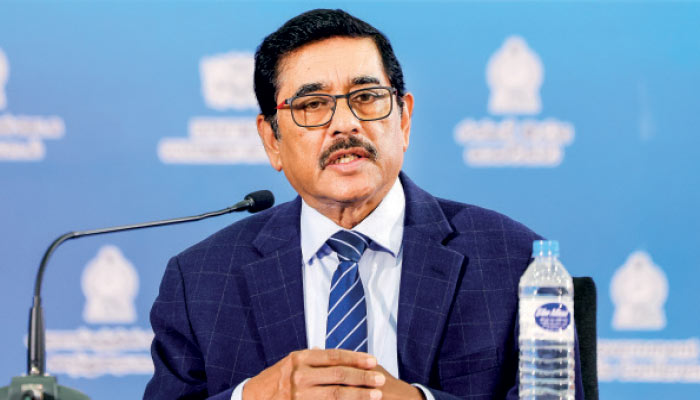Wednesday Feb 18, 2026
Wednesday Feb 18, 2026
Friday, 11 July 2025 02:56 - - {{hitsCtrl.values.hits}}

Treasury Secretary Dr. Harshana Suriyapperuma

Central Bank Governor Dr. Nandalal Weerasinghe
By Charumini de Silva
Sri Lanka yesterday laid out its strategy for navigating the latest trade headwind following the hike in US tariff on exports set to rise to 30% starting 1 August, in a high-level press briefing attended by top Government and economic officials, where they framed it as a manageable outcome and a temporary stage in a broader negotiation process that remains fluid and ongoing.
Finance Ministry Secretary Dr. Harshana Suriyapperuma confirmed that Sri Lanka was among a handful of countries to have received the largest tariff reduction under the US’s new reciprocal trade strategy, with the initially proposed 44% duty scaled down to 30%.
“Our objective is to use this window between now and 1 August to negotiate a more favourable and mutually beneficial outcome,” he added.
Dr. Suriyapperuma attributed this outcome to intensive behind-the-scenes diplomacy and sustained engagement with the US Trade Representative’s Office (USTR) and other US officials.
“We are consulting closely with all our industries and trade partners to ensure Sri Lanka puts forward a viable position that safeguards our long-term interests,” he said.
He affirmed the new rate, effective 1 August, will replace the existing 10% tariff that remains in place during the negotiation window.
Central Bank Governor Dr. Nandalal Weerasinghe welcomed the development but cautioned that further progress is essential.
We recognise the significant headway made so far, but we need to make more progress,” he said, noting that the macroeconomic impact of the new tariffs remains uncertain and will depend on evolving global conditions.
As the Government is yet to complete a full economic impact assessment, Dr. Weerasinghe noted that it was too early to quantify exact job losses or factory closures. “The effects are not unique to Sri Lanka. Exporters worldwide are feeling the heat,” he added.
Dr. Suriyapperuma confirmed that the Government has not made specific pledges or concessions to the US in exchange for the reduced tariff. “The reduction from 44% to 30% is based on the goodwill of our commitment to open, honest negotiations,” he added.
The Finance Ministry Secretary said the matter must be viewed in the context of global development, acknowledging the spillover effects. “This is not a measure targeting Sri Lanka specifically. As mentioned earlier, international organisations have predicted that this global tariff situation will impact global growth, and Sri Lanka will inevitably feel the spillover effects,” he noted.
He reiterated that the new tariff is not applicable only to Sri Lanka and applies to several other countries as well. “It is important not to look at this in isolation, but rather through a regional comparative lens; understanding how it has affected other players in the region and what Sri Lanka’s competitive position is going forward,” he explained.
Dr. Suriyapperuma also said although discussions around increasing US imports or establishing manufacturing plants in the US are underway, no formal commitments have been finalised.
In response to any International Monetary Fund (IMF) discussions on the matter, the Central Bank Governor acknowledged the IMF mission in Colombo in early April. “At the time, there were concerns that new tariffs could impact us. We explored options and alternatives, but given the uncertainty and the fact that these developments were still unfolding, we assumed the current tariff situation would remain unchanged during the last macroeconomic review,” he pointed out.
“If the situation changes materially, we have the option to revisit this with the IMF and explore additional support or modifications to the current program. Every IMF Review presents an opportunity to adjust based on evolving circumstances. But as of now, we have not factored in any changes due to this tariff situation—it’s still too early,” Dr. Weerasinghe added.
As to what lies ahead, Dr. Suriyapperuma confirmed that the next round of talks with the USTR is expected in the coming week. “Next week, we are re-engaging with the USTR and our Ambassador in the US, along with the rest of our team. We are working continuously to bring that rate down further,” he said.
The Finance Ministry Secretary also recognised the strong relationships with multilateral partners, including the World Bank, the Asian Development Bank, the IMF, and others. “Our openness, transparency, and proactive engagement with these institutions have helped deepen trust,” he stressed.
Dr. Suriyapperuma said they are expecting more support and collaborative input as negotiations move forward. “Our strategy is to create a resilient economic environment through institutional reform, investor confidence, and strategic partnerships. That is what will help us manage external shocks like this tariff issue,” he added.
In terms of the slowdown in global growth, the Central Bank Governor elaborated that it was highlighted by the IMF and other institutions that the demand for goods and services will decline.
“Higher prices will suppress demand further, and that is an accepted global economic outcome. When we make our decisions, we look at the broader macroeconomic impact. We have already factored in the likelihood of slower global growth, including from the US, into our assumptions. This is not the first time that whenever the US economy slows or interest rates increase, it affects our projections,” he added.
However, Dr. Weerasinghe acknowledged that they still do not know how big or small the impact is going to be for the economy. “It is too early to estimate exact numbers like how many jobs will be lost or how many firms might shut down. It is even difficult to isolate the impact on Sri Lanka when it is a global issue. All exporting countries are going to feel the pinch. So, we have not done a precise impact assessment yet, and it may be premature to do so now,” he said.
Referring to regional comparisons and structural challenges, Dr. Suriyapperuma opined that while tariff gaps between countries are notable, a broader issue lies in overall competitiveness. “As a country, we must invest in making our industries more competitive; not just in cost, but also in efficiency, innovation, and value addition. One key factor is energy. There is already a long-term roadmap to reduce electricity prices by increasing generation capacity and improving efficiencies,” he outlined.
The Finance Ministry Secretary also noted that while reforms take time, the Government already provided some immediate relief, such as low interest rates and inflation, helping to stabilise the business environment.